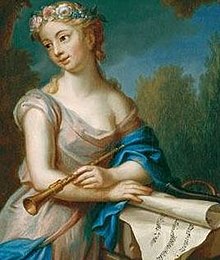Euterpe
In Greek mythology, Euterpe (in Greek Ευτέρπη, "The most pleasant one", "The one with a pleasant temper" or "The one with good cheer") is the Muse of music, especially protector of the art of playing the flute. Like the other Muses, she was the daughter of Mnemosyne and Zeus. She usually represents her crowned with flowers and carrying the double-piccolo in her hands. On other occasions she is represented with other musical instruments: violins, guitars, drums, etc. In late classical times she was called the muse of lyric poetry, and she was depicted with a flute in her hand.
A few say he invented the aulos, or double flute, though most scholars of mythology accord that honor to Athena, as revealed in the myth of Marsyas and his duel with Apollo. The Estrimón river left Euterpe pregnant. Her son, Reso, led a party of Thracians and died at the hands of Diomedes at Troy, according to Homer's Iliad.
Its name comes from the Greek eu (good) and τέρπ-εω (to please).
Contenido relacionado
Medusa (mythology)
Anj
Nirvana
Clio
Canephora
